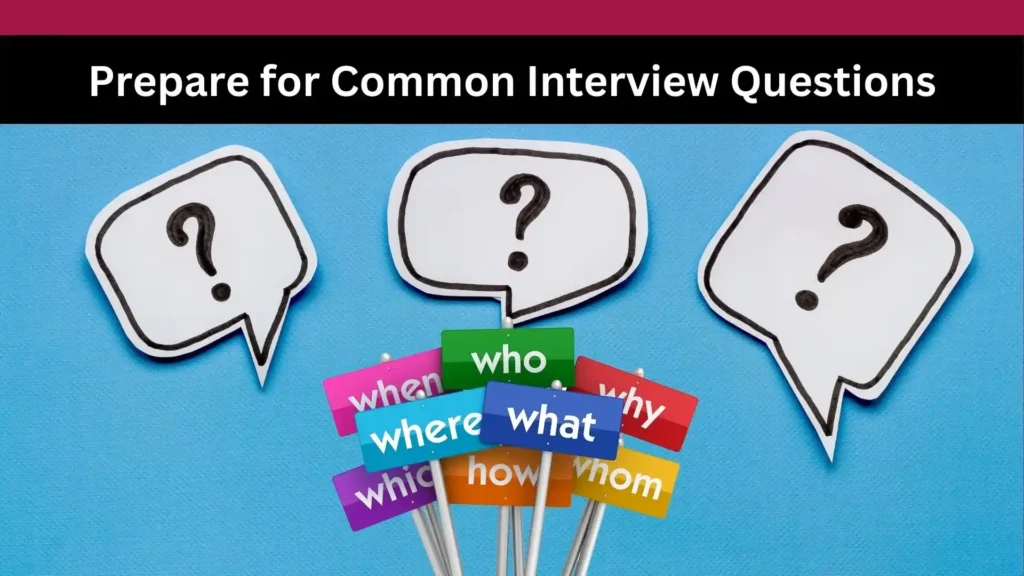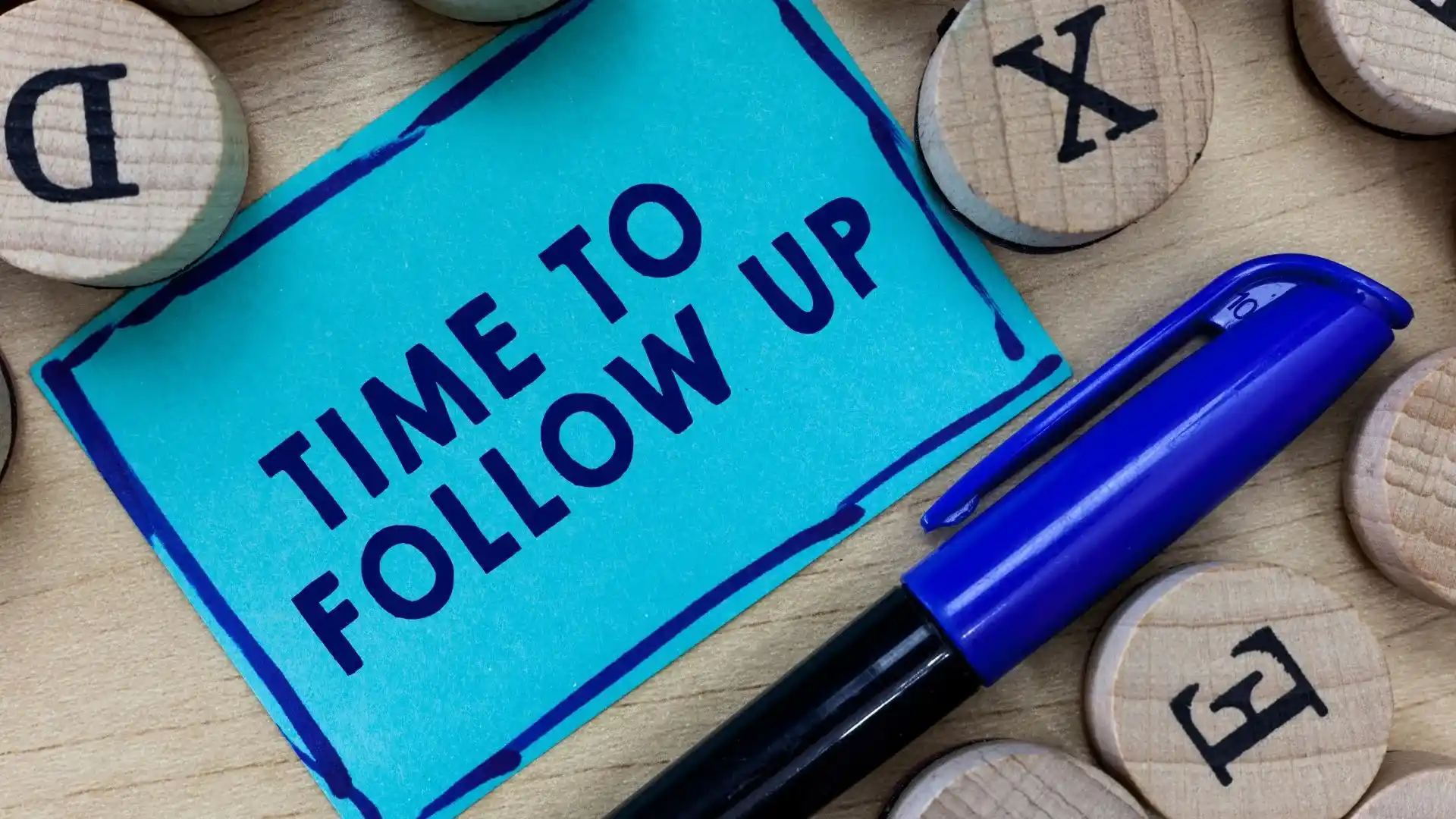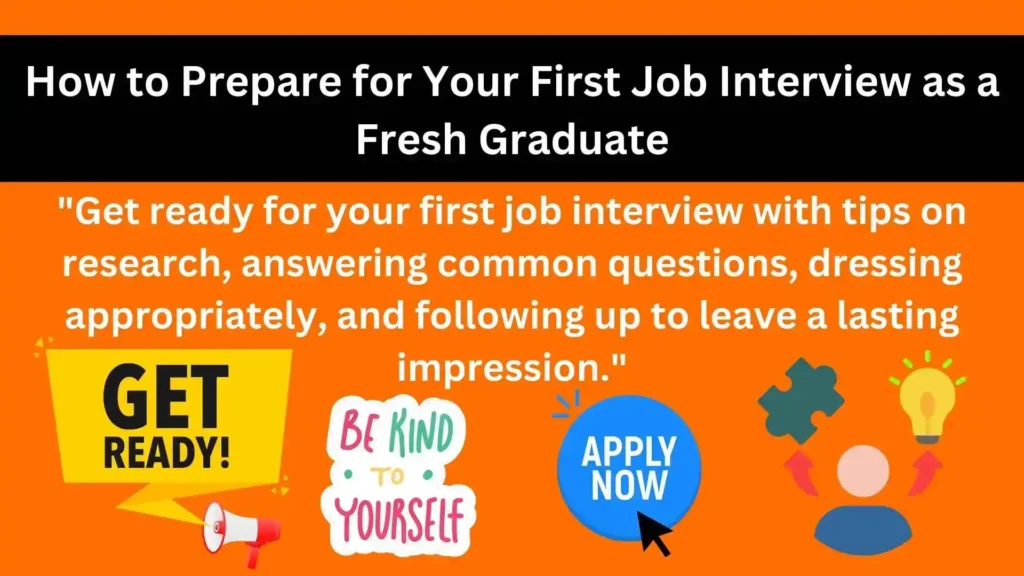After weeks of job searching, applying, and networking, you’ve finally secured an interview. Congratulations! Now, it’s time to prepare for the most important part of your job search—the interview itself. For fresh graduates, interviews can feel intimidating, but with the right preparation and mindset, you can ace your interview and leave a lasting impression on your potential employer.
In this post, we’ll show you how to ace your job interview by covering everything you need to know, from researching the company to crafting the perfect answers. Additionally, we’ll address some frequently asked questions (FAQs) to provide further guidance on your journey to success.
Table of Contents
Interview Preparation Guide
Preparing for an interview can be a nerve-wracking experience, but with the right strategies and mindset, you can confidently make a lasting impression. Whether you’re a fresh graduate stepping into the job market or a seasoned professional pursuing new opportunities, thorough interview preparation is key to success.
In this guide, we’ll walk you through essential steps—from researching the company and practicing common questions to showcasing your skills and following up professionally—ensuring you’re fully equipped to stand out in any interview setting.
1. Do Thorough Research on the Company
One of the most important steps in preparing for an interview is to research the company you’re interviewing with. This shows the employer that you’re genuinely interested in the role and the organization.

How to Research a Company:
Visit the Company’s Website: Start by reviewing the company’s mission, values, products, services, and recent news. Understand their industry and competitors.
Check Their Social Media Accounts: Many companies post updates and share company culture insights on platforms like LinkedIn, Facebook, and Instagram.
Read Employee Reviews: Platforms like Glassdoor provide reviews and insights from current and past employees, giving you a better idea of the company’s work environment.
You can search jobs on Canada Job Bank website also.Understand the Job Role: Thoroughly read the job description to understand the skills and experience the company is looking for. Prepare to discuss how your qualifications match the role.
2. Prepare for Common Interview Questions and Answers
While every interview is different, there are some questions that are commonly asked in most job interviews. Being prepared for these questions can help you feel more confident during the interview.

Top Common Interview Questions:
Tell me about yourself. Focus on your educational background, relevant experiences (internships, volunteer work), and any skills or accomplishments that relate to the job you’re applying for. Avoid going off-topic and keep it professional.
Why do you want to work for this company? This is where your research comes into play. Highlight specific reasons you’re drawn to the company—whether it’s their culture, values, mission, or industry position.
What are your strengths and weaknesses? Be honest about both. For strengths, focus on skills that align with the job. For weaknesses, mention a challenge you’ve been working on and how you’ve taken steps to improve.
Where do you see yourself in 5 years? Employers want to see that you’re motivated and have long-term career goals. Express your enthusiasm for growing with the company, while aligning your goals with the company’s mission.
Why should we hire you? This is your opportunity to sell yourself. Summarize your skills, experiences, and qualifications that make you the best fit for the job.
Practice Your Responses:
It’s important not to memorize answers, but practicing your responses can help you feel more confident. Record yourself or practice in front of a friend or family member to improve your delivery and body language.
Here are sample answers for an IT Manager position:
1. Tell me about yourself.
“I am a highly motivated IT professional with over 10 years of experience in managing IT teams, designing IT infrastructure, and ensuring system security for a wide range of organizations. I have a strong technical background in network administration, cloud solutions, and enterprise software, as well as leadership skills in driving IT projects from inception to completion.
My passion for technology is matched by my ability to lead teams and manage complex IT environments. In my previous role as a Senior IT Specialist, I successfully streamlined our IT operations, improved system security, and led a team of IT support staff. I’m now looking for the opportunity to apply my expertise as an IT Manager and contribute to the strategic direction of an organization.”
2. Why do you want to work for this company?
“I’ve been following your company’s growth and innovation for some time and am impressed by your commitment to leveraging cutting-edge technology to drive business efficiency and customer satisfaction. I admire how you focus on improving your internal systems and scaling your IT infrastructure to support your expanding global operations.
I believe my experience in leading IT teams and managing large-scale technology projects aligns perfectly with your company’s goals. I’m excited about the opportunity to contribute to your team and help you achieve your technology-driven objectives.”
3. What are your strengths and weaknesses?
Strengths: “One of my key strengths is my ability to lead cross-functional teams in a high-pressure environment. I am able to break down complex IT problems and translate them into manageable tasks for my team. I’m also highly organized, which helps me to prioritize tasks and ensure that critical IT operations run smoothly.
Another strength is my passion for continuous learning, which allows me to stay updated with the latest technologies and innovations.”
Weaknesses: “One area I’m continuously working on is delegating tasks more effectively. As someone who is very hands-on, I sometimes find myself taking on more responsibilities than I should.
However, I’ve been actively working on improving this by trusting my team more and empowering them to take ownership of tasks, which has led to better collaboration and overall efficiency.”
4. Where do you see yourself in 5 years?
“In five years, I see myself as an established IT Manager with a broader responsibility in shaping the technology strategy for the organization. I hope to have contributed to scaling your IT infrastructure to meet future challenges and have successfully led a high-performing IT team. I also envision myself further developing my skills in areas like cloud architecture and cybersecurity, as I continue to evolve with the industry.”
5. Why should we hire you?
“You should hire me because I bring a unique combination of technical expertise and leadership experience. I have a proven track record of managing IT teams, optimizing IT systems, and ensuring business continuity. I’m passionate about aligning IT initiatives with business goals and improving operational efficiency. I understand the importance of collaboration and communication in driving results and am confident that I can lead your IT department in achieving its strategic objectives while also fostering an environment of innovation and continuous improvement.”
3. Showcase Your Soft Skills
As a fresh graduate, you may not have years of professional experience, but you have something just as valuable—soft skills. Soft skills like communication, problem-solving, teamwork, and adaptability are highly sought after by employers. Make sure to highlight these skills during your interview.

How to Showcase Soft Skills:
Communication: Speak clearly, listen actively, and avoid interrupting the interviewer. Practice your interview answers but stay flexible to the conversation.
Teamwork: Share examples of group projects from school or extracurricular activities that demonstrate your ability to work well with others.
Problem-Solving: Share instances when you identified a challenge (even in your academic life) and came up with a solution.
Adaptability: Employers value employees who can adjust to changing environments. Talk about times you’ve adapted to new situations, whether in school, internships, or volunteer work.
4. Dress Appropriately and Be Punctual
First impressions are crucial. Your appearance and punctuality can significantly impact the way an interviewer perceives you.

Dressing for Success:
Dress According to the Company’s Culture: If you’re interviewing for a corporate job, opt for formal attire. For more casual or creative industries, business casual may be appropriate. When in doubt, it’s better to be slightly overdressed than underdressed.
Pay Attention to Grooming: Make sure your hair is neat, your clothes are clean and ironed, and you’re well-groomed. A polished appearance shows professionalism and respect for the interview process.
Be On Time:
Arrive Early: Plan to arrive at least 10-15 minutes early for the interview. It’s a sign of respect for the interviewer’s time and demonstrates your punctuality.
Prepare for the Unexpected: Factor in potential delays like traffic or public transportation issues. Leave early to ensure you arrive on time.
Interview success strategies
Achieving success in a job interview requires more than just answering questions—it’s about presenting yourself as the ideal candidate through careful preparation and effective communication. Whether you’re a first-time job seeker or an experienced professional, mastering interview success strategies can make all the difference in standing out from the competition.
In this guide, we’ll explore proven techniques to help you excel, including how to build confidence, tailor your responses, highlight your strengths, and leave a lasting impression that will set you on the path to securing the job you desire.
5. Ask Thoughtful Questions
At the end of the interview, most interviewers will ask if you have any questions. This is a great opportunity to demonstrate your interest in the company and the role. Be prepared with thoughtful questions that go beyond basic information.

Good Questions to Ask:
Can you tell me more about the team I’ll be working with?
What is the company culture like?
What does success look like in this role?
How do you support employee development and growth?
What are the next steps in the interview process?
Why Asking Questions is Important:
Asking questions shows that you’ve done your research and are genuinely interested in the role. It also helps you determine if the company and the job are the right fit for you.
6. Follow Up After the Interview
Sending a follow-up email after your interview is a professional gesture that shows your appreciation for the opportunity. It also reinforces your interest in the position.

How to Write a Follow-Up Email:
Thank the Interviewer: Start by thanking the interviewer for their time and for considering you for the role.
Reiterate Your Interest: Reinforce why you’re excited about the position and how your skills align with the company’s needs.
Express Gratitude Again: Close by thanking them once again for the opportunity to interview.
Here’s a simple example of a follow-up email:
Subject: Thank You for the Interview Opportunity
Dear [Interviewer’s Name],Thank you for taking the time to interview me for the [Job Title] position at [Company Name]. I greatly appreciate the opportunity to learn more about your team and the exciting work you’re doing. I’m very enthusiastic about the role and believe my skills and background make me a strong fit for the position.
I look forward to hearing from you regarding the next steps. Thank you once again for your time and consideration.
Best regards,
[Your Name]
FAQs About Job Interviews for Fresh Graduates
Q: How can I handle nerves before an interview?
A: Practice relaxation techniques such as deep breathing, positive visualization, and mindfulness exercises. The more prepared you are, the more confident you’ll feel.
Q: What should I bring to the interviews?
A: Bring several copies of your resume, a notepad and pen for taking notes, and any other materials the interviewer might request, such as a portfolio or reference letters.
Q: How can I answer tough behavioral interview questions?
A: Use the STAR method (Situation, Task, Action, Result) to structure your responses. This helps you clearly articulate your experience and skills in real-life situations.
Q: What if I don’t know the answer to a question?
A: Be honest. It’s okay to admit if you don’t know the answer, but demonstrate your willingness to learn and problem-solve. For example, say, “I don’t know the answer to that, but here’s how I would approach finding the solution.”
Conclusion
Job interviews can be nerve-wracking, especially for fresh graduates, but with the right preparation, you can make a lasting impression and secure the job of your dreams. From researching the company and practicing common interview questions to dressing appropriately and sending a follow-up email, each step plays a crucial role in your success.
Remember, confidence, preparation, and a positive attitude will help you shine during your interview. Good luck!





